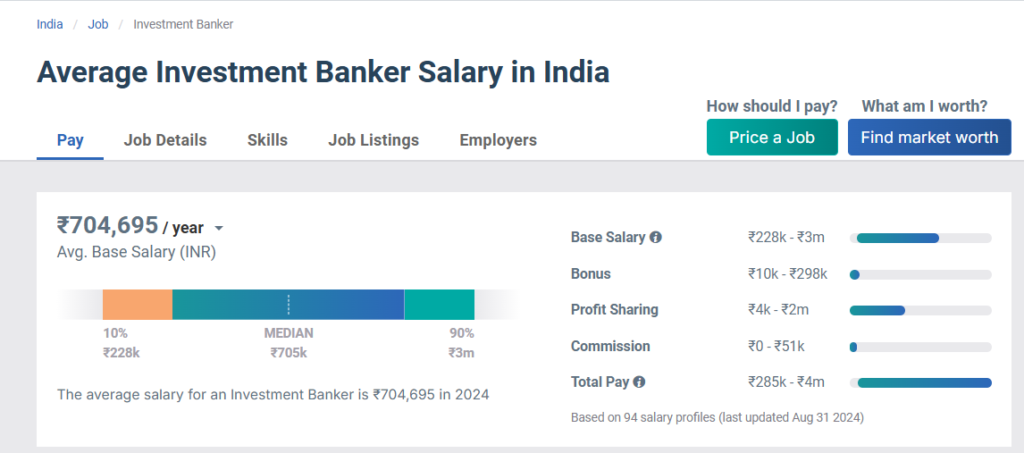Becoming an investment banker in India can open doors to a rewarding and prestigious career. If you’ve ever asked, “How can I become an investment banker?” or “Investment banker kaise bane?”, this guide is here to help you understand the path and skills you’ll need to succeed.
In this field, you’ll encounter various types of investors in the stock market, which is central to your role in advising, analyzing, and raising capital for clients.
Let’s dive into the steps involved, focusing on education, skills, and certifications.
Understand What Investment Banking Is All About

Investment banking is a specialized field where you’ll help companies, institutions, and even governments raise capital and make strategic financial decisions. The core skills you’ll need are analytical thinking, a solid grasp of numbers, and strong communication. If these sound like skills you’d enjoy honing, then this might be the path for you.
Educational Pathway to Becoming an Investment Banker
So, how can I become an investment banker from scratch? It all begins with education. In India, most investment bankers start by earning a bachelor’s degree in fields like finance, economics, or business administration. If you’re reading this right after completing your 12th, now is the time to focus on a degree that provides a strong foundation in financial principles.
Many students also ask, how to become an investment banker after 12th? It’s straightforward: choose a bachelor’s program with a focus on finance or commerce. This gives you the groundwork needed for more advanced studies or on-the-job learning in investment banking.
Master’s Degree: The Preferred Route

Most professionals in this field go on to complete an MBA (Master of Business Administration) or a Master’s in Finance. While not mandatory, these programs are often considered essential to how to become an investment banker after MBA, as they provide advanced training in finance and management.
An MBA from a top university or one of the best institutions in India for investment banking education will also help you build a strong network – which is invaluable in this career.
Choosing the Right Investment Banking Courses
There are a number of investment banking courses online that can supplement your formal education. Platforms like Coursera, Udemy, and edX offer specialized courses in finance, mergers, acquisitions, and financial modeling.
When it comes to investment banking education in India, institutes like NSE Academy, BSE Institute, and Imarticus Learning provide certified programs that can give you an edge.
My Personal Recommendation: The Valuation School
If you’re looking to dive deeper into valuation and financial modeling, I highly recommend exploring The Valuation School. They offer a range of specialized programs, including:
- Advanced Valuation & Financial Modelling: Perfect for gaining a deep understanding of complex financial models and valuation techniques.
- Equity Research Cohort: A great way to develop a strong foundation in analyzing stocks and understanding market dynamics.
- LinkedIn Mentoring Cohort: A unique mentoring program that helps you connect with industry professionals and gain insights that can elevate your career.
These courses are an excellent way to set yourself apart and gain practical knowledge that can directly contribute to your success as an investment banker.
Gaining Relevant Experience Through Internships
Once you have the educational foundation, gaining real-world experience is the next step. Start with internships in financial institutions, ideally with a focus on top investment banks in India, if possible. These opportunities can give you the hands-on experience that makes all the difference when applying for full-time positions.
Networking and Building Connections in the Industry

One critical aspect of investment banking is networking. It might feel intimidating initially, but connecting with professionals already in the field will give you insights and could even open doors for job opportunities.
LinkedIn is a fantastic place to begin; join relevant groups, follow investment banking professionals, and share content that reflects your growing knowledge.
Attending events and seminars related to investment banking education in India can also broaden your network. Investment banking is as much about people as it is about numbers; the more connected you are, the better your prospects.
Preparing for Investment Banking Interviews
So now you’ve done the studying, the interning, and the networking. What’s next? Nailing your interview. Preparation is everything here. Investment banking interview preparation should cover the technical and behavioral aspects – from understanding financial modeling to answering questions about handling stress or teamwork.
If possible, practice with friends or mentors already in the field. Their insights can be invaluable in helping you feel ready and confident.
Investment Banking Salary Expectations in India
One of the big draws of a career in investment banking is the compensation. The investment banking salary in India is typically on the higher side.
Entry-level analysts can expect competitive salaries, but as you gain experience, your earnings can grow significantly. Positions at top investment banks in India offer especially attractive packages, which only increase as you rise through the ranks.
Final Thoughts
The road to becoming an investment banker is not easy, but if this field excites you, the journey is more than worth it. So, whether you’re asking yourself, how to become an investment banker after 12th or wondering about the investment banking career path more broadly, each step brings you closer to a challenging yet rewarding career.
Take it one step at a time, invest in the right education, seek hands-on experience, and don’t forget to build connections. I hope this guide has helped you understand what lies ahead and inspired you to take that first step!
Also Read:












